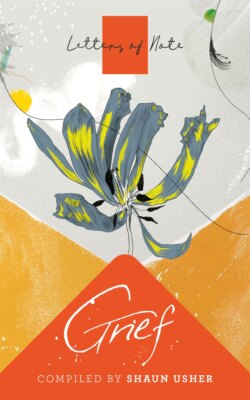Читать книгу Letters of Note: Grief - Группа авторов - Страница 10
На сайте Литреса книга снята с продажи.
ОглавлениеLETTER 01
SORROW MUST BE SORROW
George Eliot to Lady Lytton
8 July 1870
To most people, Mary Ann Evans is better known as George Eliot, a pen name which adorns the covers of her seven novels – including, most notably, Middlemarch, A Study of Provincial Life, which is considered to be her masterpiece. It was in July of 1870, a year before that novel’s publication, that Eliot wrote this letter. Her friend, Lady Lytton, was dealing with the recent loss of her uncle, George Villiers, 4th Earl of Clarendon, who for all intents and purposes had for many years acted as her father.
THE LETTER
Harrogate
I did not like to write to you until Mr. Lytton sent word that I might do so, because I had not the intimate knowledge that would have enabled me to measure your trouble; and one dreads, of all things, to speak or write a wrong or unseasonable word when words are the only signs of interest and sympathy that one has to give. I know now, from what your dear husband has told us, that your loss is very keenly felt by you, that it has first made you acquainted with acute grief, and this makes me think of you very much. For learning to love any one is like an increase of property—it increases care, and brings many new fears lest precious things should come to harm. I find myself often thinking of you with that sort of proprietor’s anxiety, wanting you to have gentle weather all through your life, so that your face may never look worn and storm-beaten, and wanting your husband to be and do the very best, lest anything short of that should be disappointment to you. At present the thought of you is all the more with me because your trouble has been brought by death; and for nearly a year death seems to me my most intimate daily companion. I mingle the thought of it with every other, not sadly, but as one mingles the thought of some one who is nearest in love and duty with all one’s motives. I try to delight in the sunshine that will be when I shall never see it any more. And I think it is possible for this sort of impersonal life to attain great intensity—possible for us to gain much more independence than is usually believed of the small bundle of facts that make our own personality. I don’t know why I should say this to you, except that my pen is chatting as my tongue would if you were here. We women are always in danger of living too exclusively in the affections, and though our affections are, perhaps, the best gifts we have, we ought also to have our share of the more independent life—some joy in things for their own sake. It is piteous to see the helplessness of some sweet women when their affections are disappointed; because all their teaching has been that they can only delight in study of any kind for the sake of a personal love. They have never contemplated an independent delight in ideas as an experience which they could confess without being laughed at. Yet surely women need this sort of defence against passionate affliction even more than men. Just under the pressure of grief, I do not believe there is any consolation. The word seems to me to be drapery for falsities. Sorrow must be sorrow, ill must be ill, till duty and love towards all who remain recover their rightful predominance. Your life is so full of those claims that you will not have time for brooding over the unchangeable. Do not spend any of your valuable time now in writing to me, but be satisfied with sending me news of you through Mr. Lytton when he has occasion to write to Mr. Lewes.
I have lately finished reading aloud Mendelssohn’s “Letters”, which we had often resolved and failed to read before. They have been quite cheering to us from the sense they give of communion with an eminently pure, refined nature, with the most rigorous conscience in art. In the evening we have always a concert to listen to—a concert of modest pretensions, but well conducted enough to be agreeable.
I hope this letter of chit-chat will not reach you at a wrong moment. In any case, forgive all mistakes on the part of one who is always yours sincerely and affectionately.
